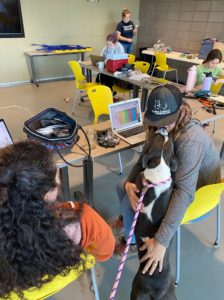We loved that it was a non-invasive study where no animals were hurt or placed in uncomfortable situations.
In order to gather this type of evidence, companion animal scientist Lisa Gunter, Ph.D., and Maddie’s Fund Research Fellow at Arizona State University are conducting a study in conjunction with Pima Animal Care Center (PACC) to determine just how big of an impact week-long fostering can have on the health and welfare of shelter dogs.
Gunter works in the ASU Department of Psychology and conducts research in the Canine Science Collaboratory. She’s worked for nearly a decade with pets in animal shelters as well as canines and their pet parents. Her goal, to better the lives of companion animals and their owners, is the driving force behind all of her work, including Wagfield Academy, an online dog training and behavior resource for owners, and The Institute for Shelter Dogs.
Gunter and PACC Public Information Officer Nikki Reck have observed that canines do better in home environments until they can be placed in forever homes, no matter how well run or equipped shelters may be.
Currently, the research is being conducted on the East Coast at the Charlottesville Albemarle SPCA, where they are collaborating with researchers at Virginia Tech. In July and August, they worked on the Western component of the project.
At PACC, 41 dogs were fostered as part of the study and followed for 17 days. Urine was collected for five days prior to fostering, seven days during fostering, and another five days post-fostering upon return to the shelter. The research team and fosters became experts at catching urine during that time. The canine participants also wore activity collars known as accelerometers during the study, which tracked their activity in both shelter and foster settings.
As a bonus, Reck says PACC is gaining valuable insight from the foster caregivers regarding an animal’s behavior in a home setting to share with potential adopters. “Studies like these are great for the animal welfare world, as we’re able to learn so much from them, and it helps us be better at our jobs where the animals are concerned. We were so excited to be chosen for inclusion in the study. It’s such an honor to be one of only two shelters selected nationwide. We loved that it was a non-invasive study where no animals were hurt or placed in uncomfortable situations. Honestly, it was a no-brainer for us to get on board.”
The research team behind the Arizona State University/Virginia Tech Maddie’s Nationwide Foster Study has been helping shelters with field trip, sleepover, emergency and safety net fostering programs since 2018 and has worked with more than 100 shelters across the country during this time. Results of the study are expected to be published in 2022. FBN





